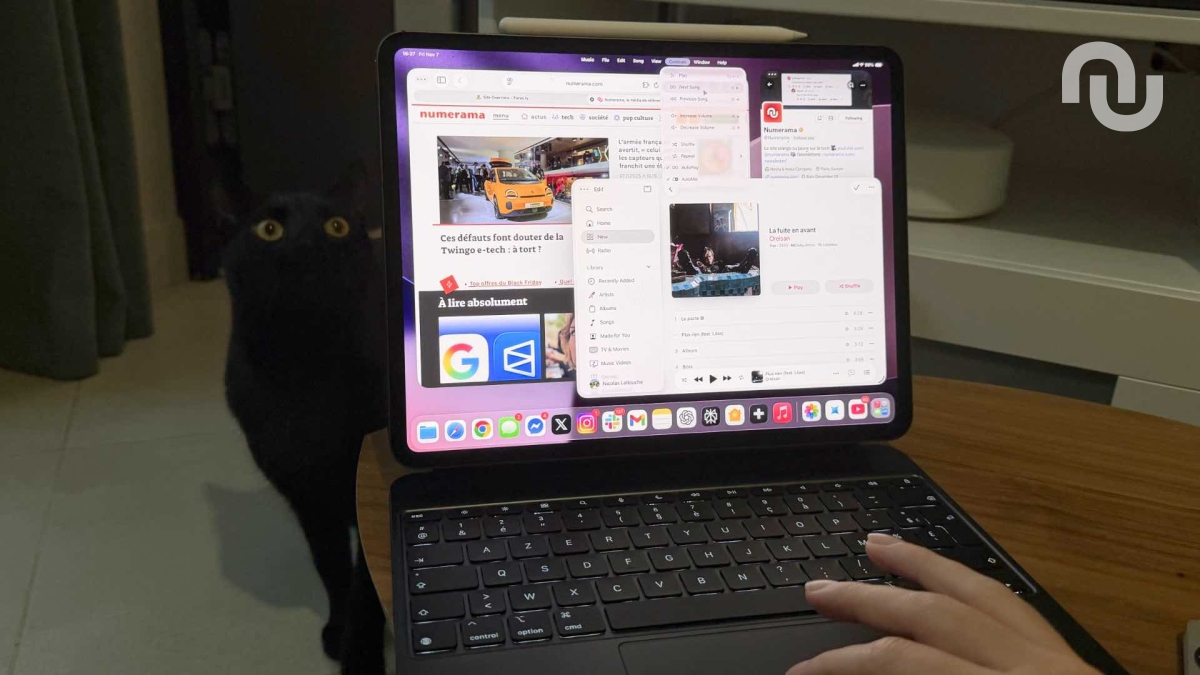Les abeilles meurent-elles forcément après avoir piqué ?

Selon une croyance populaire, les abeilles mourraient après avoir piqué, contrairement aux guêpes. Cette affirmation mérite d’être questionnée scientifiquement et la réponse est surprenante !

Selon une croyance populaire, les abeilles mourraient après avoir piqué, contrairement aux guêpes. Cette affirmation mérite d’être questionnée scientifiquement et la réponse est surprenante !

[Témoignage] Julien est-il le Français avec le plus de données sur lui-même, sa santé et ses efforts physiques ? Si on exclut les sportifs professionnels, peut-être. Avec les wearables, l'IA et les agents, ces données bien interprétées pourraient être la clef d'une révolution en matière de santé publique. Que possède-t-on et que peut-on faire après 15 ans de quantified self ? C'est ce qu'il va vous raconter.

[Deal du jour] Comme les AirTags d’Apple, les balises de Samsung se fixent sur vos objets et permettent de les retrouver plus facilement. Elles deviennent bien plus intéressantes en promotion.

Avec à peu près 50 % du marché en Europe, Bosch domine clairement le marché du VAE. Vous voulez acheter un vélo électrique, mais vous ne comprenez rien à la gamme de moteurs que votre vélociste vous a mis sous les yeux ? Vous êtes au bon endroit : après 8 ans à tester des vélos majoritairement équipés chez Bosch, on vous a écrit le guide ultime pour tout comprendre aux moteurs allemands.

Revivez la plus célèbre bataille de la saga Star Wars dans un jeu de figurines accessible et dynamique. Entre stratégie, hasard et immersion, c’est La Bataille de Hoth, notre jeu de société de la semaine. Comment ça se joue ? Quel est notre avis ? On vous dit tout.

Vince Gilligan est enfin de retour avec un nouveau projet après Breaking Bad et Better Call Saul : Pluribus, sur Apple TV. Mais que signifie exactement ce titre énigmatique ?

Le président de Nintendo, Shuntaro Furukawa, veut multiplier les projets au cinéma. En plus du film Mario Galaxy et du live-action sur Zelda, la firme nippone a deux autres projets à venir.

Après plusieurs mois d'absence, le Tesla FSD va revenir en Chine d'ici février ou mars 2026, promet Elon Musk. Et en Europe, le patron compte sur ses clients pour faire pression aux autorités et faire valider la conduite autonome.

La banque mobile, en collaboration avec le YouTubeur français Inoxtag, a annoncé le 8 novembre 2025 des cartes bancaires aux couleurs de son manga « Instinct ».

Leapmotor a lancé les préventes en Chine de sa nouvelle berline compacte 100 % électrique Lafa 5, qui s'appellera B05 en Europe. L'occasion d'en savoir enfin un peu plus sur les caractéristiques techniques et surtout les prix, qui pourraient mettre un coup de massue aux marques européennes.

Le fabricant de semi-conducteurs Nexperia aurait repris ses exportations vers les constructeurs européens. Un véritable soulagement dans une industrie dépendante de seulement quelques acteurs.

[Deal du jour] Un stabilisateur permet de filmer un petit week-end entre amis ou en famille, et de regarder ces précieux souvenirs sans avoir mal à la tête. Moins cher, ce modèle de Insta360 vaut le coup pour le Black Friday.

Des chercheurs en cybersécurité ont découvert neuf paquets malveillants disséminés dans la bibliothèque de codes NuGet. Certains de ces pièges, destinés à compromettre les projets des développeurs qui les téléchargent, ont été programmés pour délivrer la charge offensive parfois plusieurs années après leur création. Explications.

À partir du 18 novembre, GTA V devrait faire son grand retour dans le catalogue PlayStation Plus, en version PS5 et en version PS4. Un bon moyen de se replonger dans Los Santos, en attendant GTA VI qui ne cesse d'être repoussé.

La production des Anneaux de pouvoir saison 3 a passé une étape : le tournage s'achève. Place maintenant à la phase de post-production, pour une diffusion en streaming attendue au second semestre 2026.

Tesla a donné des nouvelles de son camion Semi lors de sa conférence annuelle dédiée aux investisseurs. Ce dernier va profiter d'évolutions techniques et notamment changer de faciès, alors que sa production n'a pas réellement commencé.

Les taïkonautes des missions Shenzhou-20 et Shenzhou-21 ont inauguré la pratique du « barbecue spatial » à bord de Tiangong le 4 novembre. Le tout, grâce à un nouveau four intégré aux systèmes de la station.

Un an et demi après une mise à jour majeure de l'iPad Pro, avec un écran OLED et un châssis ultra-fin (5,1 millimètres), Apple propose une révision plus timide de sa tablette avec une meilleure puce (la M5) et le support du Wi-Fi 7. L'iPad Pro bénéficie aussi d'une recharge un peu plus rapide. Nous en avons fait notre « ordinateur » pendant trois semaines.
The bootc project allows users to create a bootable Linux system image using the container tooling that many developers are already familiar with. It is an evolution of OSTree (now called libostree), which is used to create Fedora Silverblue and other image-based distributions. While creating custom images is still a job for experts, the container technology simplifies delivering heavily customized images to non-technical users.

Renault vient de présenter la quatrième génération de sa Twingo et on peut dire qu'elle fait couler beaucoup d'encre. La citadine est passée au 100 % électrique et elle ressuscite l'emblématique première mouture au look de grenouille. Cependant, celle-ci fait l'objet de vives critiques, oubliant le contexte automobile actuel.